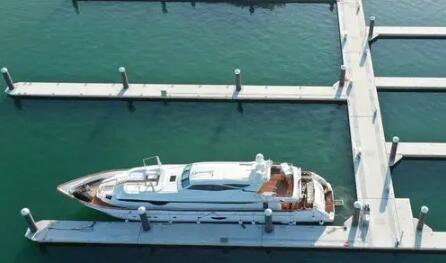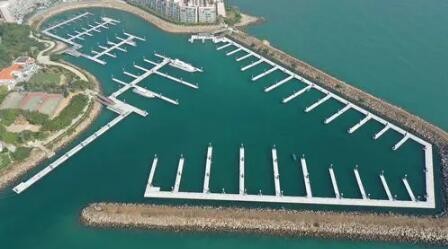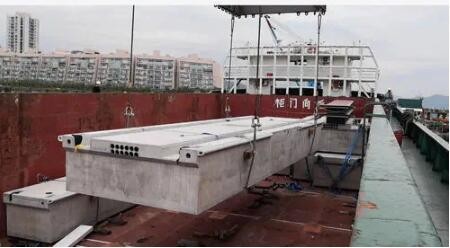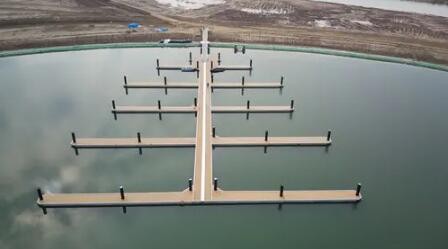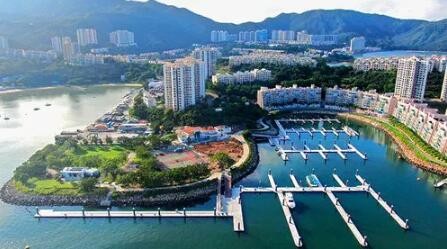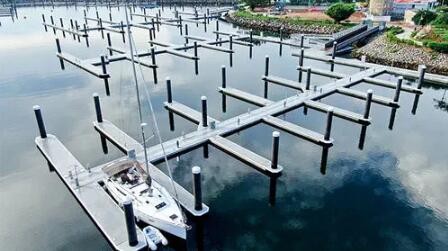漂浮式海港系泊浮桥(重型混凝土制浮桥)
重要参数
| 类型 | 漂浮式 |
| 用途 | 系泊 |
| 应用 | 用于海港 |
| 材料 | 混凝土 |
| 其他特性 | 重型 |
| 长度 | 15 m(49'02" ) |
| 宽度 | 2.4 m, 2.7 m(7'10" , 8'10" ) |
| 干舷 | 500 mm(20 in) |
| 重量 | 15 t(17 us ton) |
产品简介混凝土强度:40 N/mm2 增强塑料纤维混凝土,暴露等级符合欧洲 EN 206-1 标准。锚固系统:导桩锚固系统(钢导桩)、弹性系泊系统、岸边滑轨锚固系统。 聚苯乙烯泡沫芯材 通过数控加工将聚苯乙烯泡沫切割成浮桥形状,然后安装在浮桥模具中。混凝土浇注使聚苯乙烯泡沫与混凝土完美粘合在一起,形成无缝浮动结构。泡沫密度为 15kg/m3,抗压强度高,吸水率低,可使混凝土浮桥永不下沉。 GOODOCKS 的混凝土浮桥系统深受私人客户和大型游艇俱乐部投资者的青睐。高德致力于为客户提供优秀的混凝土浮桥系统,专业的设计结合优质充足的材料,使产品具有高稳定性、安全性和耐用性。 GOODOCKS 的混凝土浮桥系统可用于建造长度为 6-20 米、宽度为 2.4-5 米、单重为 15-70 吨的各种标准尺寸的单体浮桥。虽然混凝土浮桥系统的结构比一般的浮桥系统复杂,但经过标准化的产品设计后,现场安装就像搭乐高积木一样简单。柔性直通杆和耐压橡胶块用于构成浮动单体浮桥之间的连接系统。在一定范围内,柔性通杆可形成万向接头,使浮桥能适应各个方向的任意波浪漂浮。 英文简介Strength of Concrete: 40 N/mm2 reinforced plastic fiber concrete, with exposure grade conforming to European EN 206-1 standard.Anchoring System: pile guide anchoring system (steel pile guide), elastic mooring system, shore slide rail anchoring system. Polystyrene Foam Core The polystyrene foam is cut into the shape of a pontoon by numerical control processing and installed in the pontoon mold. Concrete casting makes polystyrene foam perfectly stick together with concrete to form a seamless floating structure. The foam density is 15kg/m3 with high compressive strength and low water absorption, which can make the concrete pontoon never sink. GOODOCKS’ concrete pontoon system is favored by private customers and large yacht club investors. GOODOCKS is committed to providing customers with excellent concrete pontoon system, professional design combined with high-quality and sufficient materials, so that the products can be with high stability, safety and durability. A variety of standard sizes of single pontoon, with a length of 6-20m, a width of 2.4-5 m and a single weight of 15-70t, can be used for building concrete pontoon system in GOODOCKS. Although the structure of concrete pontoon system is more complex than the usual one, after the standardized products design, the on-site installation can be as simple as building LEGO blocks. Flexible thru-rods and pressure-resistant rubber blocks are used to form a connection system between floating monomer pontoons. Within a certain range, the flexible thru-rods can be form universal joints, so that the pontoons can adapt to the arbitrary floating of waves in all directions. |
推荐信息
| 高质量重型侧卸车(侧移式升降机) |
2023-10-17
|
查看详情 >> |
| 船用搬运千斤顶(微型电动履带运输车) |
2023-11-25
|
查看详情 >> |
| 水产养殖下锚 |
2023-12-12
|
查看详情 >> |
| 高密度的漂浮式模块 |
2024-01-23
|
查看详情 >> |
| 电动船坞牵引拖车 |
2023-11-02
|
查看详情 >> |






















































